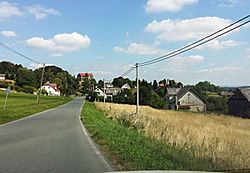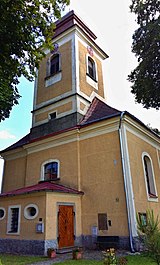Milíře
Milíře | |
|---|---|
 General view | |
| Coordinates: 49°47′47″N 12°33′2″E / 49.79639°N 12.55056°E | |
| Country | |
| Region | Plzeň |
| District | Tachov |
| First mentioned | 1669 |
| Area | |
| • Total | 14.89 km2 (5.75 sq mi) |
| Elevation | 635 m (2,083 ft) |
| Population (2024-01-01)[1] | |
| • Total | 235 |
| • Density | 16/km2 (41/sq mi) |
| Time zone | UTC+1 (CET) |
| • Summer (DST) | UTC+2 (CEST) |
| Postal code | 347 01 |
| Website | www |
Milíře (German: Brand, Tachauer Brand) is a municipality and village in Tachov District in the Plzeň Region of the Czech Republic. It has about 200 inhabitants.
Administrative parts
[edit]The village of Zadní Milíře is an administrative part of Milíře.
Etymology
[edit]The name literally means 'charcoal piles'.
Geography
[edit]Milíře is located about 6 kilometres (4 mi) west of Tachov and 58 km (36 mi) west of Plzeň. It lies in the Upper Palatinate Forest. The highest point is at 750 m (2,460 ft) above sea level.
History
[edit]The first written mention of Milíře is from 1669. Zadní Milíře was first mentioned in 1778.[2]
In 1946, most German-speaking inhabitants were expelled. After the war, the area was only partly repopulated.
Demographics
[edit]
|
|
| ||||||||||||||||||||||||||||||||||||||||||||||||||||||
| Source: Censuses[3][4] | ||||||||||||||||||||||||||||||||||||||||||||||||||||||||
Transport
[edit]
There are no railways or major roads passing through the municipality.
Sights
[edit]The main landmark of Milíře is the Church of Saints Peter and Paul. It was built in the Neoclassical style in 1814–1816. Together with the rectory, school, memorial cross and World War I memorial, it forms a valuable set of historical buildings.[5]
References
[edit]- ^ "Population of Municipalities – 1 January 2024". Czech Statistical Office. 2024-05-17.
- ^ "Historie" (in Czech). Obec Milíře. Retrieved 2022-09-21.
- ^ "Historický lexikon obcí České republiky 1869–2011" (in Czech). Czech Statistical Office. 2015-12-21.
- ^ "Population Census 2021: Population by sex". Public Database. Czech Statistical Office. 2021-03-27.
- ^ "Kostel sv. Petra a Pavla" (in Czech). National Heritage Institute. Retrieved 2022-09-21.



